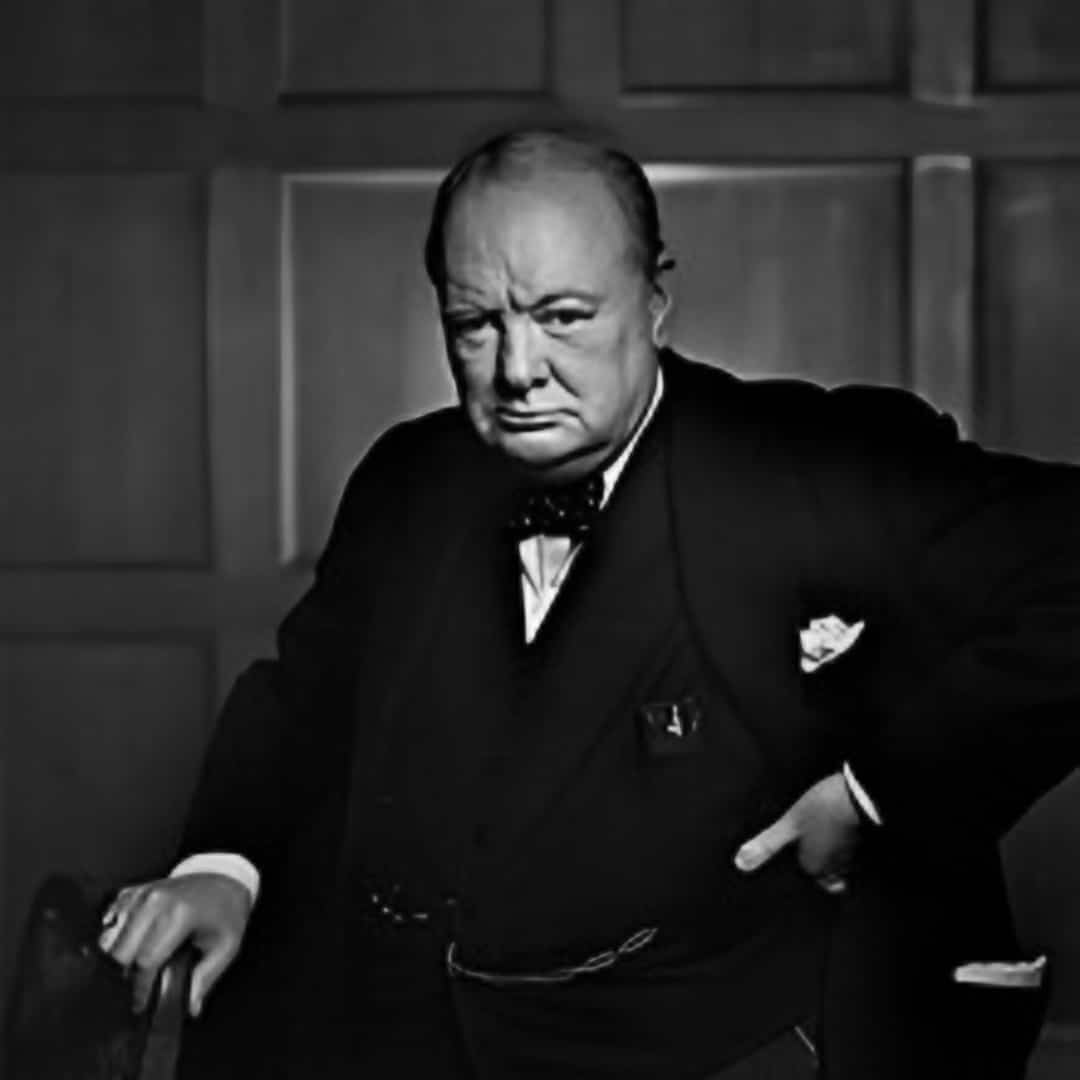
Winston Churchill emerged as a legendary leader during World War II through his dynamic leadership and unmatched oratory skills.
Ascending to Prime Minister in May 1940, he inspired unity and resilience with powerful speeches such as "blood, toil, tears, and sweat."
His strategic decisions, like the Dunkirk evacuation, and alliances, helped shape the Allied efforts against Axis powers.
As Europe descended into chaos with the German invasion of France and the Low Countries, Winston Churchill ascended to the position of Prime Minister on May 10, 1940, succeeding Neville Chamberlain.
Churchill's appointment came at a critical juncture, initially met with skepticism from both Conservatives and the Labour Party. However, his decisive actions and powerful rhetoric soon garnered acceptance.
He established a coalition government, integrating key figures from both parties to guarantee effective wartime governance. Churchill's emphasis on unity and resilience was evident in his first speech as Prime Minister, invoking "blood, toil, tears, and sweat" to rally public support.
The successful Dunkirk evacuation, which he termed a "miracle of deliverance," further solidified his leadership during Britain's darkest hours.
Churchill's ascendancy to Prime Minister marked the beginning of a leadership era defined by extraordinary oratory skill. His speeches, a masterful blend of improvisation and meticulous crafting, were instrumental in uniting and motivating the British populace during the grim days of World War II.
Key themes of unity, courage, and collective effort were woven into his oratory, underscoring the fight for homeland and a greater cause. His iconic "Blood, toil, tears and sweat" speech set the tone for resilience, preparing the public for impending challenges.
Churchill's commitment to effective speech-making was evident in "The Scaffolding of Rhetoric," which outlined the essential elements of impactful oratory. Surveys from the era reflected his profound influence on public morale and support.
A multitude of strategic decisions underpinned Winston Churchill's leadership during World War II, each essential in shaping the course of the conflict.
Faced with immediate challenges upon becoming Prime Minister, Churchill orchestrated the Dunkirk evacuation, rescuing 338,226 servicemen and bolstering British morale.
His emphasis on the Battle of Britain underscored its significance to the survival of Christian civilization, urging unity against the Axis powers.
Demonstrating a commitment to strategic military actions, he ordered the attack on the French fleet at Mers-el-Kébir to prevent German acquisition.
Importantly, Churchill fostered the Grand Alliance, aligning the United States and Soviet Union to coordinate efforts against Germany.
Prioritizing Germany's defeat over Japan reflected a focused strategy shaping Allied military engagements.
Building on strategic acumen, Churchill's leadership in times of crisis was defined by his unwavering resolve and ability to inspire.
As a wartime leader, he became Prime Minister on May 10, 1940, a significant moment in World War II, uniting the nation against Nazi aggression. His speeches, particularly "Blood, toil, tears and sweat," rallied public support and resilience.
During the Dunkirk evacuation, Churchill's leadership was pivotal, overseeing the rescue of 338,226 servicemen, celebrated as a "miracle of deliverance."
His regular radio broadcasts and visits to bomb-damaged areas maintained public morale amid the devastating Blitz.
Churchill's strategic decisions and adaptability to military challenges fortified Britain's resolve, ensuring the nation remained steadfast against overwhelming odds.
Endurance defines the legacy of Winston Churchill, whose wartime leadership left an indelible mark on history and public consciousness.
His tenure as Prime Minister from 1940 to 1945 is celebrated for galvanizing the British public and the Allies, with approval ratings exceeding 78%. Churchill's speeches, rich with eloquence and themes of unity, inspired occupied nations, fostering resilience during WWII.
The Big Three Alliance, established under his guidance, shaped post-war geopolitics and international cooperation. Despite losing the 1945 election, his wartime leadership remains a symbol of British resilience.
Churchill's legacy extends beyond politics; his literary contributions earned him the Nobel Prize for Literature in 1953, cementing his influence in history and literature.
Winston Churchill is best known for his leadership during World War II, marked by his stirring speeches, strategic vision, and role in forming the Grand Alliance, which were essential in rallying Allied forces against Nazi Germany's aggression.
Churchill's great leadership stemmed from his inspirational speeches, strategic foresight, and ability to rally both military and civilian support. His resilience, diplomatic skill, and unwavering commitment to victory uniquely positioned him as an iconic figure during World War II.
Upon Japan's attack on Pearl Harbor, Churchill expressed that the event was a "great and terrible" moment but saw it as a pivotal opportunity for unity, believing the U.S. entry would greatly bolster the Allied cause.
During World War II, Winston Churchill united Britain under a coalition government, inspired national resilience through stirring speeches, and forged essential alliances with the United States and Soviet Union, greatly impacting the Allied strategy and ultimate victory.
In sum, Winston Churchill's leadership during World War II remains a tribute to his extraordinary resolve and vision.
His mastery of oratory uplifted spirits, while his strategic acumen steered Allied forces toward victory. Faced with unparalleled crises, Churchill's steadfast courage and decisive actions not only shaped the outcome of the war but also cemented his legacy as a paragon of leadership.
His enduring influence continues to inspire future generations, reminding us of the profound impact one determined leader can have on history.